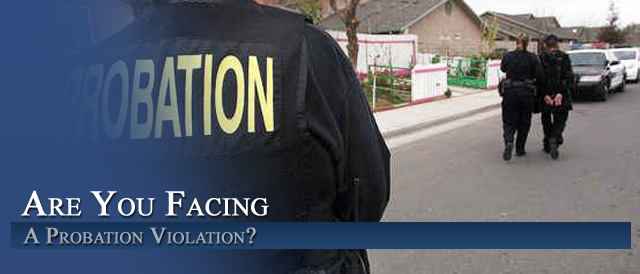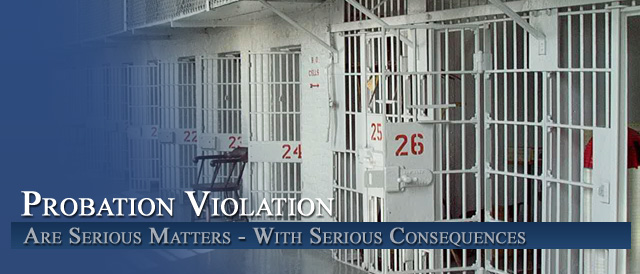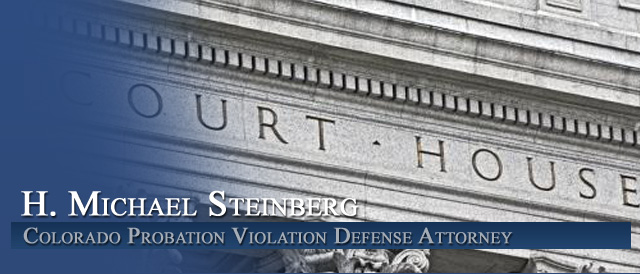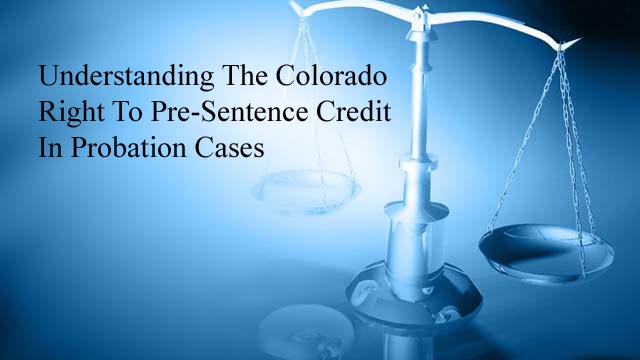




Understanding The Colorado Right To Pre-Sentence Credit In Probation Cases
By H. Michael Steinberg Colorado Probation Violation Criminal Defense Lawyer – Email The Author – [email protected]
 Understanding The Colorado Right To Pre-Sentence Credit In Probation Cases begins with a study of the Colorado Law – 18-1.3-405 Credit for Presentence Confinement – that governs the rules that apply in every situation where a defendant seeks credit for time spent in custody on a criminal case.
Understanding The Colorado Right To Pre-Sentence Credit In Probation Cases begins with a study of the Colorado Law – 18-1.3-405 Credit for Presentence Confinement – that governs the rules that apply in every situation where a defendant seeks credit for time spent in custody on a criminal case.
Here is the Colorado law at issue:
18-1.3-405. Credit for Pre-sentence Confinement
A person who is confined for an offense prior to the imposition of sentence for said offense is entitled to credit against the term of his or her sentence for the entire period of such confinement. At the time of sentencing, the court shall make a finding of the amount of presentence confinement to which the offender is entitled and shall include such finding in the mittimus.
The period of confinement shall be deducted from the sentence by the department of corrections. A person who is confined pending a parole revocation hearing is entitled to credit for the entire period of such confinement against any period of reincarceration imposed in the parole revocation proceeding.
The period of confinement shall be deducted from the period of reincarceration by the department of corrections. If a defendant is serving a sentence or is on parole for a previous offense when he or she commits a new offense and he or she continues to serve the sentence for the previous offense while charges on the new offense are pending, the credit given for presentence confinement under this section shall be granted against the sentence the defendant is currently serving for the previous offense and shall not be granted against the sentence for the new offense.
2014 Case Clarifies When And How Pre-sentence Credit Is Calculated
On February 3, 2014, in the case – People v. Smith, the Colorado Supreme Court held that a the law – 18-1.3-405 Credit for Presentence Confinement does not apply to jail sentences that are ordered by judges when those judges impose probation…that the law does not apply to the jail component of a probation sentence.
While the law does not mandate pre-sentence credit a jail sentence when a defendant is sentenced to jail as a condition of probation, that same judge has discretion on whether to credit an offender for presentence confinement in full, in part, or not at all.
The Law Re – Explained:
The statutory provision governing Presentence Confinement Credit or PSCCfor for felony criminal sentences (section 18-1.3-405) does not apply to probation, and therefore does not apply to the jail component of a probation sentence.
Because a trial court is not compelled by section 18-1.3-405 when sentencing a felony offender to probation with a jail component, the decision of whether to give pre-sentence confinement credit is completely within the judge’s discretion.
What Is Pre-Sentence Confinement Credit? (PSCC)
PSCC refers to the time credit that a person earns while in jail awaiting sentencing on an offense and unable to post bail.
Jail as a Condition of Probation – Understanding Probation
To understand probation you need to first understand the nature of imposing a sentence. Every felony and misdemeanor sentence can result in incarceration without probation. In Felony cases, probation is an alternative to a prison sentence. A prison sentence is primarily punitive in scope. Probation is a sentencing alternative to prison and serves a very different purpose. Unlike prison, probation is intended to be rehabilitative in nature providing the sentenced person with an opportunity to avoid serving a harsher sentence.
Probation must be applied for and receiving probation is a privilege and not a right. If the defendant applies for and accepts probation – the offender must also accept the court’s conditions or “terms” of probation. A court cannot impose a sentence to probation without the offender’s consent.
Therefore, if the defendant rejects probation, the court may sentence the offender to imprisonment under section18-1.3-104. The court has the authority to grant an offender probation comes under section 18-1.3-202.
Jail As A Condition Of Probation Is Authorized By 18-1.3-202.
A judge may impose any conditions on a defendant’s probation that are authorized under Colorado law. A judge has broad discretion to impose whatever conditions the judge believes are appropriate “to ensure that the offender leads a law-abiding life.”
“[T]he court may grant the defendant probation for such period and upon such terms and conditions as it deems best.§ 18-1.3-202”
One of the conditions of probation that may be imposed in Colorado felony cases is up to 90 days of jail as a term of probation. For misdemeanors it is up to 60 days county jail. §18-1.3-202.
Judge’s View The Purpose Of Jail As A Deterrence Of Future Crimes
The Colorado Courts view probation with a condition of jail time as a deterrence “to deter future illegal activity.. . .”
Colorado Presentence Confinement Credit and Sentences Directly To Incarceration
When a defendant is NOT sentenced to probation – but rather receives a sentence directly to prison (DOC) or the county jail – this same law – Section 18-1.3-405 – requires the trial court record the amount of a felony offender’s presentence confinement on the mittimus and then directs the department of corrections (“DOC”) to deduct the period of confinement appearing on the “mittimus” (the court’s written order) from the offender’s sentence.
At the time of sentencing, a judge is required to make a finding of the exact amount of pre-sentence confinement to which the offender is entitled.
The mandatory award of pre-sentence confinement credit not only applies to an offender sentenced to DOC, it also applies to the imposition of jail for a misdemeanor under section 18-1.3-509, C.R.S. in the absence of a sentence to probation of course.
Summery – Understanding The Colorado Right To Pre-Sentence Credit In Probation Cases
Here are the words of the Colorado Supreme Court in the 2014 case of People v. Smith
“…the requirement that an offender receive PSCC does not apply to probationary sentences, even when those probationary sentences include a jail component. As a result, an offender who is sentenced to county jail as a condition of probation has no right to be credited for presentence confinement under section 18-1.3-405. Whether to credit an offender for such presentence confinement is committed to the discretion of the trial court.”
It has been my experience however that Judges WILL exercise their discretion and award pre-sentence credit the defendant even though – when granting probation – they are not mandated to do so.
Understanding The Colorado Right To Pre-Sentence Credit In Probation Cases
ABOUT THE AUTHOR: H. Michael Steinberg – Email The Author – A Denver Colorado Probation Violation Criminal Defense Lawyer – or call his office at 303-627-7777 during business hours – or call his cell if you cannot wait and need his immediate assistance – 720-220-2277.
If you are charged with A Colorado crime or you have questions about Understanding The Colorado Right To Pre-Sentence Credit In Probation Cases, please call our office. The Law Offices of H. Michael Steinberg, in Denver, Colorado, provide criminal defense clients with effective, efficient, intelligent and strong legal advocacy. We can educate you and help you navigate the stressful and complex legal process related to your criminal defense issue.
 H. Michael Steinberg, is a Denver, Colorado criminal defense lawyer with over 40 years of day to day courtroom experience – specializing in Colorado Criminal Law along the Front Range. He will provide you with a free initial case consultation to evaluate your legal issues and to answer your questions with an honest assessment of your options. Remember, it costs NOTHING to discuss your case. Call now for an immediate free phone consultation.
H. Michael Steinberg, is a Denver, Colorado criminal defense lawyer with over 40 years of day to day courtroom experience – specializing in Colorado Criminal Law along the Front Range. He will provide you with a free initial case consultation to evaluate your legal issues and to answer your questions with an honest assessment of your options. Remember, it costs NOTHING to discuss your case. Call now for an immediate free phone consultation.
Helping Clients To Make Informed Decisions In the Defense of Colorado Criminal Cases.
Contact A Lawyer with Three Decades of Experience as a Denver Criminal Attorney at The Steinberg Colorado Criminal Defense Law Firm Today.
Colorado Defense Lawyer H. Michael Steinberg provides solid criminal defense for clients throughout the Front Range of Colorado – including the City and County courts of Adams County, Arapahoe County, City and County of Boulder, City and County of Broomfield, City and County of Denver, Douglas County, El Paso County – Colorado Springs, Gilpin County, Jefferson County, Larimer County, and Weld County,…. and all the other cities and counties of Colorado along the I-25 Corridor… on cases involving … Understanding The Colorado Right To Pre-Sentence Credit In Probation Cases.
Other Articles of Interest:
- Make a Payment
- Bad News – A Colorado Deferred Judgment Is Not Technically A Probation Sentence
- When Does A Colorado Probation Sentence Actually Start?
- Understanding Probation Revocation Polcies In Colorado Probation Revocation Decision Making
- Understanding Probation In Colorado – The Concept Behind Probation – How It Works












